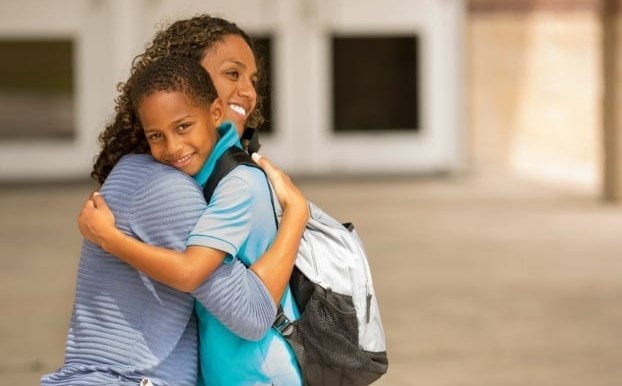7 Ways to Prepare Your Family for Kindergarten

Time flies.
One minute they’re a tiny baby who can’t even lift their heads, then you blink and they’re getting ready to start school.
Kindergarten is a major transition for children and families, especially if you’re experiencing it with your first child. Then, you add an ongoing pandemic into that equation.
From continued childcare to food, transportation and communication, here are some things you can do to prepare for the big day:
Visit the school with your child
Familiarity will be helpful going into your child’s first day of school. Get them used to it by setting up a visit and driving the route a few times. Explain to them that this will be where they start kindergarten and let them ask questions about the school, the building, teachers and whatever else comes to their little but growing minds.
Though COVID-19 is still ongoing, some schools are allowing tours. Call and speak with your school’s administration or parent liaison to see what your options are; also keep a list of key contacts to have at your disposal.
Some schools even offer meet-and-greet opportunities and transitional kindergarten programs that replicate a typical school day.
However, online schooling programs require a different approach. Arrange virtual meetings with teachers and administrators so you can ask questions in advance. This is an ideal choice if you don’t live near an institution offering education; homeschooling families could also utilize this route.
Tutoring may provide additional preparation before entering school; for this purpose, consider enrolling them in preschool programs. Don’t forget to keep asking questions throughout the year as online programs allow parents more involvement in their children’s education.
Plan for lunch and transportation
Will your child enjoy school lunch or food from home? If you plan on packing lunch, what will that look like realistically on a daily basis? It might be helpful to meal prep and pack lunch the night before. Think about whether they will have school breakfast or not, too.
Will you be dropping your kiddo off or do you need to use school bus services? What time is pickup? Make a list of food and transportation questions relevant to your family in the weeks leading up to kindergarten and give yourself some time to answer them.
Plan for extended childcare
Most schools end the day around 2 p.m. If you’re a working parent, determine if you’ll need after-school care. If your school does not offer it, there may be one nearby that does. Local daycares also provide after-school care for an additional fee.
Also think about who you will rely on for unexpected school closures and working holidays.
Learning At Home
Try to take time to engage in learning at home, so your child isn’t completely thrown off when they start kindergarten. Sights like ABCmouse can assist in starting to learn a little earlier. Don’t put too much pressure on them, but this app is a good place to start introducing schoolwork. You can find lots of lessons and activities on various sites, so they are worth taking a look to ensure a smooth transition into kindergarten.
Don’t ignore COVID-19
The pandemic is still affecting us, but we’re still finding ways to move on. Masks mandates are few and far between these days, and our little ones are probably suffering from mask fatigue or will need some time adjusting if masks are required.
Talk to your school representative about COVID-19 safety precautions. All you can do is your best. Encourage your child to continue with thorough handwashing, cover his or her mouth when coughing or sneezing and avoid touching their face as much as humanly possible (we know, right?).
When they come home from school, it might be a good idea to have them immediately change out of their school clothes. Spray down shoes and frequently touched surfaces, too.
Make sure to include your student
Let them be part of the process as much as possible. Ask how they’re feeling along the way and let them know you are a safe space. Allow your student to explore their own curiosities about kindergarten. Talk to them about their impending responsibilities once they become a kindergartener.
You can even read a few books, such as King of Kindergarten (a great read for young ladies, too).
Provide the time and space they need to transition, and including them is a great way to ease any anxiety for both of you.
Don’t forget about social skills
While we may be hyper focused on flashcards, numbers, letters and reading, we can’t ignore some of the skills our little ones will need outside of academics.
Consider the self-help and personal care tools they’ll need in a classroom and school setting. Think about manners, language and even coping skills.
Communication and listening skills are vital in the classroom environment, so it is a wise idea to get your child’s hearing checked before they start kindergarten. If your child does need hearing aids, getting them before they start kindergarten will allow them time to get used to wearing them.
Additionally, this Facebook post elaborates wonderfully on this idea of social skills:
